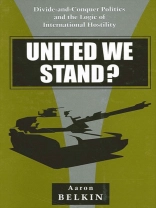Argues that leaders sometimes promote international conflicts to keep their own military politically divided.
It has long been assumed that leaders engage in international conflict to unify their followers-what is often called the ‘rally ’round the flag’ hypothesis. Despite its intuitive appeal, however, this hypothesis does not always provide a compelling explanation of the relationship between domestic politics and international conflict. In United We Stand? Aaron Belkin shows that in one important realm, civil-military relations, leaders often prefer divisiveness over cohesion. When they feel domestically vulnerable, leaders use international conflict in order to create and exacerbate rivalries among their own military forces to lower the risk of a coup and to contribute to the consolidation and stability of the political order. Case studies include post-Soviet Georgia and Syria.
قائمة المحتويات
Preface
Acknowledgments
PART ONE: INTRODUCTION
1. Regime Vulnerability and International Conflict
PART TWO: THEORY
2. Coup Risk and Military Division: Hostility within the Armed Forces and Regime Survival
3. A Theory of Counterbalancing as a Cause of International Conflict
PART THREE: DATA
4. Regime Vulnerability, Counterbalancing, and International Conflict during the Cold War: A Quantitative Analysis
Aaron Belkin and Evan Schofer
5. Regime Vulnerability as a Cause of Counterbalancing in Syria in the Early 1970s
6. When Dividing the Military Provides an Incentive for Conflict: Fragmented Military Forces and International Conflict in Shevardnadze’s Georgia
7. Conclusion
Notes
References
Index
SUNY Series in Global Politics
عن المؤلف
Aaron Belkin is Assistant Professor of Political Science at the University of California at Santa Barbara. He is the coeditor (with Geoffrey Bateman) of Don’t Ask, Don’t Tell: Debating the Gay Ban in the Military.












